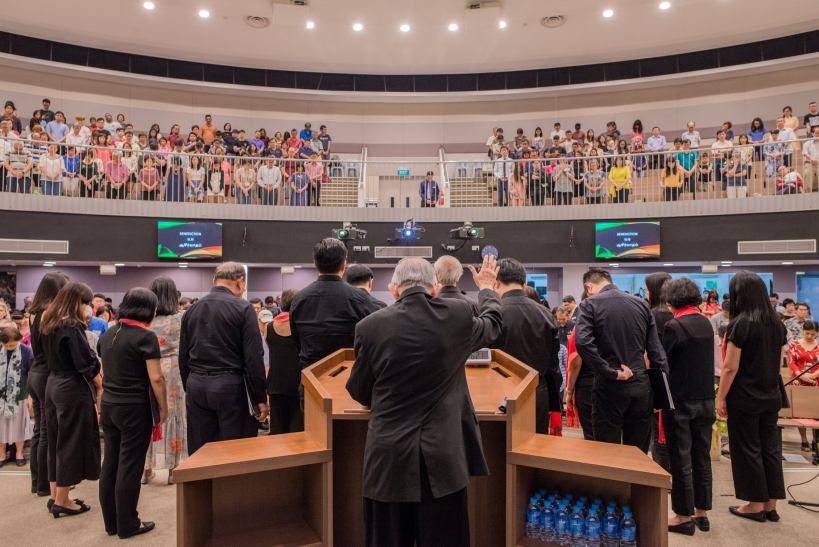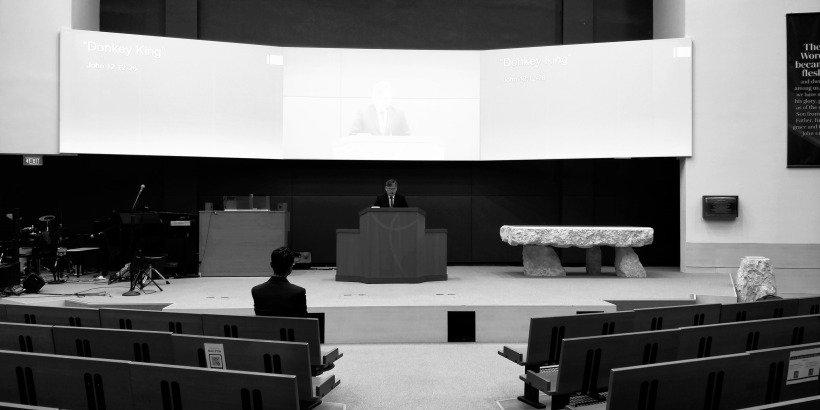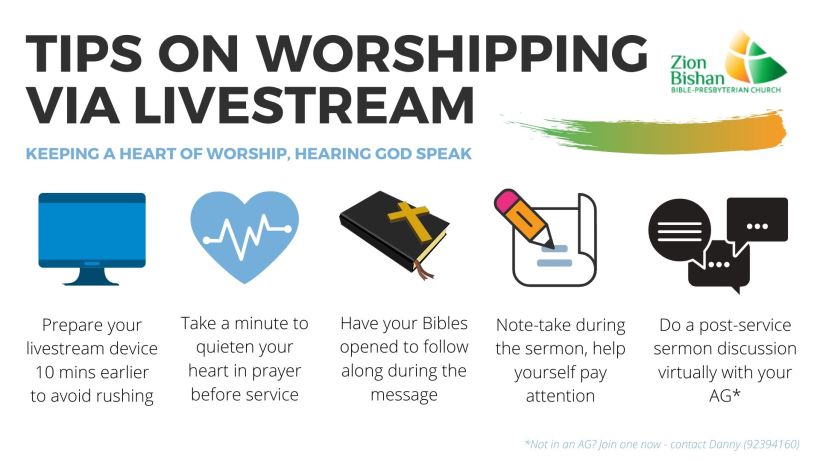The Lion Still Roars: Lamenting Our Uncaring Ears
Written by Dn Danny Chua
Originally posted here. Reposted with permission.
Part 2: Repentance Prayers from the Book of Amos for this Virus Pandemic
The lion has roared; who will not fear?
Amos 3:8

Not too long ago, towards the end of 2019, we in Zion Bishan spent 14 Sundays listening to 14 piercing sermons from the book of Amos. Week after week, the Lion – our Lord God – roared over and over again. Why am I recalling all of this in the middle of our ‘circuit breaker’ isolation period? It’s because I finally realized recently that every single thing I miss about ‘church’ as I knew it, and the ‘Christian faith’ as I knew it, were the very things I took for granted when life and Sundays were ‘normal’. In this second of a three-part reflection, I hope to help us reflect and repent of our apathy and indifference towards God’s spoken Word.
Lamenting Our Uncaring Ears
On a typical week, I ‘watch’ and listen to at least 1 or 2 video-sermons online if I have to eat a meal at home alone or if I have tall enough a mountain of clothes to iron at one go. So, when our church started livestreaming our services and sermons about a month ago, I genuinely thought that it wouldn’t take too much effort for me to adapt to weekly, virtual sermons on a screen. Same same, right?
I was wrong. It wasn’t that the preachers weren’t eloquent or effective (to be fair, which of our preachers were trained to be televangelists or camera-friendly for the already challenging task of preaching anyway?) It wasn’t that the video stream was poor compared to some Desiring God videos or Christian media out there. In fact, our PA team has been nothing short of incredible in the last couple of months (please thank them!).
It was incredibly hard to adapt to virtual sermons because I wanted a personal connection with the preacher. Yes, I could see him on the screen. Yet, the inexplicable dissonance of physical separation made deeper, personal connection challenging.
I even wanted to engage with the preacher! Maybe I wouldn’t have ordinarily laughed out loud at his jokes but I would have at least smiled, or chuckled, or looked at my neighbor on the pew to see their reaction. I’m not the “amen!” type but I would have at least nodded in agreement. And as a preacher myself, I know such engagement with or ‘participation’ in his sermon would have made a difference to him and to us – not because he needed our affirmation as it were but because our participation in his sermon is in our very partaking together as preacher and listeners in the Word of God.

See, deep inside, many of us know it’s not enough to just be “online churchgoers” receiving “online words” from the “online video”. In the words of, René Breuel, a Brazilian pastor serving in hard-hit Italy, reminds us: “A video stream and text messages are no substitute for embodied life.”
My own reflection above got me thinking. I wondered since I now have such a high view of listening to God’s Word in person, in a church sanctuary, what would I do differently when physical services resume? In what way would I treasure His Word or the preachers’ sermons more? Would I respond differently ?
That’s when I realized I didn’t’ need to think ahead to the future scenario of, God-willing, ‘normal church life’ resuming. In fact, I only needed to look back at ‘normal church life’ past, and examine my posture and my attitude towards the preached Word. I encourage you to reflect along with me.
What were our attitudes towards those portions of service when God’s Word is spoken (e.g. Sermons, Scripture readings)?
In what ways did we prepare or not prepare our hearts and ears to hear the Lord speak each Sunday?
“Hear this word that the Lord has spoken against you, O people of Israel, against the whole family that I brought up out of the land of Egypt”
Amos 3:1
In Amos’ time, the words of God had fallen on deaf ears for a long, long time. For centuries, the Lord had patiently and fiercely warned His covenant people to return to Him – to forsake their idolatry, to repent of their injustices. At the root of it all, Israel committed all these sins really because she had stopped listening to her God. No surprise then – when only one person in a relationship tries to no avail to reach the other stubborn one, that bond is essentially dead.
Can you remember how things got so bad that whenever the Lord spoke in the book of Amos, we are explicitly told “thus says the LORD” (14 times!) or “hear this” (5 times). It’s as though when God speaks, He actually has to spell it out that He is speaking. Like an a furious parent to a stubborn child, the Lord had to repeatedly rebuke, “Listen up! I, your Father am speaking to you. Open your ears and listen very carefully now.”
“Behold, the days are coming,” declares the Lord God, “when I will send a famine on the land— not a famine of bread, nor a thirst for water, but of hearing the words of the Lord. They shall wander from sea to sea, and from north to east; they shall run to and fro, to seek the word of the Lord, but they shall not find it.”
Amos 8:11-12
When we walked through the book of Amos during our sermon series and AG bible studies, I remembered how these verses above struck me like no other. What would it take for the Lord to say this to Israel? Yes, they had grown uncaring and dull ears, but surely… He wouldn’t withhold His voice from them? This would be as good as the end for Israel – no more instruction, no more good news, no more encouragement, no more promises. Above all, no more relationship.
Remember how Israel had a special position in all the world purely because of her relationship with Yahweh (Amos 3:2) – He personally initiated the covenant, related to them and spoke to them. He was the God who promised and delivered when brought them out of Egypt (Amos 2:10). But now, no more words. No more relationship.
Some commentators think the 400 years of silence towards the end of Old Testament history, before Jesus took on flesh signified that “famine of the word”. We don’t know what exactly that famine looked like or when it happened but we know for sure that it would have been an eerily quiet period of darkness and hopelessness. How awful it would have been to seek the word of the Lord everywhere but not find it!
As I recall ‘normal church life’, I think of all the times we enjoyed the luxury of that very Word projected on the screen for us. The convenience of that very Word held in our hands – physical Bibles or electronic ones. The privilege of having dedicated, rostered brothers and sisters read those words aloud beautifully for us. The Word of God served on a silver platter, in the form of our devoted preaching team and pastors. ‘Normal church life’ was an absolute buffet of God’s Word!

Even now, we can hardly say we’re experiencing a spiritual famine of God’s Word of any kind. We still enjoy these pleasures and delights albeit in a truncated, reduced form. But the loss of the ‘normal’ should prime us to reexamine our hearts and ears. We’re well-placed now in this mini, enforced fast from physical services to ponder how we’ve treated the precious words of our Father in Heaven.
I personally think of all those times I paid no attention as I closed my uncaring ears during Scripture reading while a fellow brother or sister read the passage for us to prepare our hearts.
I think of those Sundays I didn’t even bring my physical Bible to service (my own preference) simply because I rushed out of my house. I recall those moments when I realized I forgot to bring a pen to take notes of the sermon – I’d bothered enough to dress up for church and do my hair but not enough to prepare practically to receive God’s word.
I remember the times I heard a preacher say something about the text that I disagreed with, and I harbored a spirit of criticism and annoyance instead of graciously engaging his thought and his hard-prepped words by listening on.
Some of us may look back with much regret for all these moments when our ears and hearts couldn’t care less about the Creator of all things and our Heavenly Father speaking. Let us reflect, repent, and then, let us reorient our ears and hearts during this circuit breaker period of decentralized worship.
Church, let us cry out in repentance to our Father today:
“Father, we are sorry for taking your words for granted. We have forgotten what a privilege and mystery it is that the God of all the universe would stoop so low to speak with us. We have disregarded and wasted the words of our Lord Jesus, the very Word of God Himself, we’ve ignored Him all those instances. We’re a people happy with just showing up and nodding off. We’re a people satisfied with just sitting there, with hearts miles away. Strike us with great grief and anguish at our hard-hearted attitudes. Peel open our uncaring ears to listen up as You’ve declared time and time again of Jesus in Scripture, “This is my Son, whom I have chosen; listen to him.” And to borrow the words of this prayer from Pastor John Piper, “Do not waste our misery and grief, O Lord. Purify your people from powerless preoccupation with barren materialism and Christless entertainment. Put our mouths out of taste with the bait of Satan. Cut from us the roots and remnant of pride and hate and unjust ways. Grant us capacities of outrage at our own belittling of your glory. Open the eyes of our hearts to see and savor the beauty of Christ. Incline our hearts to your word, your Son, and your way. Amen””
Here are some practical tips on how we can help ourselves hear God better during this season of livestreamed services:

Also, I learnt that many AGs are meeting online after the service (on Zoom) to discuss the sermon and pray about the truths they’ve learnt. That’s such a great way to help one another hear God’s word and meditate upon His message for us each week – why not consider doing that with your small group?








